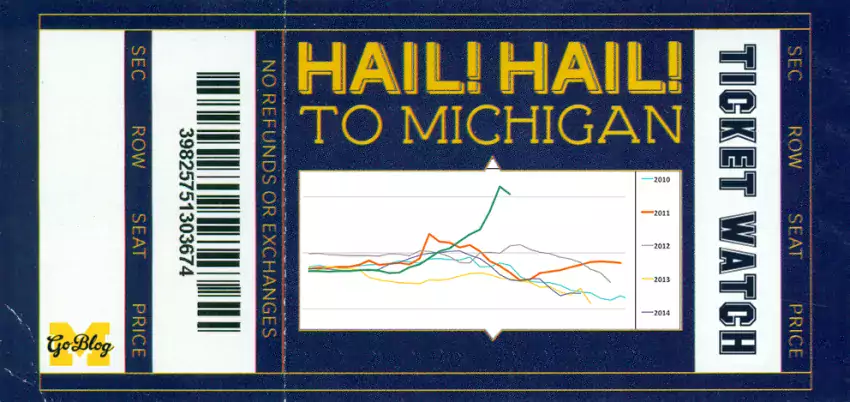
Ticket Watch Preferred Two Cokes

I’ve let this feature wither lately, both because we had a year with no tickets and because what Michigan’s been doing with the ticket market is wonkish, corrupt, and depressing.
What moved me to address it is I think the athletic department’s own short-sighted decisions are going to lead to a remarkably empty Michigan Stadium this year. When that happens, people who don’t bother to cover or think about systemic problems are going to start saying Michigan fans have lost interest in their team. The truth will be something more like “Michigan fans don’t want to pay NFL prices (i.e. $80/ticket) to get into a game versus NIU or Rutgers, and the school and its partners won’t let them in for less.”
In general I prefer to let for-profit entities do what they do within ethical, moral, and legal bounds. My interest is that I believe that certain predatory practices are going to be highly damaging to the long-term health of the program. Every empty seat is one fan who won’t make a connection with the program that day. They’re also visible to the players, the recruits who visit, and the media, who will weave them into simple narratives that are always a referendum on the coach.
Michigan can’t rid society of Great Man Theory (except its history department is doing just that), and the AD has contracts and budgetary responsibilities after a $65M shortfall last year that tie their hands far more than we like to acknowledge. And make no mistake: the coach bears responsibility for the low fortunes of his team last year, and the resulting low expectations are a primary driver of ticket interest.
But I also believe that even with a simmering pandemic, Michigan can make marginally the same amount of money if they make filling Michigan Stadium with Michigan fans a priority. The question—and I don’t know the answer—is whether their contractual obligations will allow the price of tickets to come down to the value of those tickets.
I also see a couple of factors coming together to accidentally shift an unheard of number of Michigan tickets to the secondary market, where Michigan’s official ticket partner’s predatory practices are set up to leave a majority of those tickets unused.
[After THE JUMP: wonky]
Digital Seats
Michigan first made a deal in 2011 under Dave Brandon to make StubHub the official secondary marketplace. The deal was extended in 2017. I am working on finding the details of their current arrangement—it’s not being withheld; I just haven’t had the time to pursue it yet.
The StubHub partnership was the start of the department moving into the secondary ticketing market. The purpose was not purely monopolistic. The unregulated emerging online ticket market had major security flaws: tickets could be listed simultaneously in multiple exchanges, and print-at-home tickets could be easily copied.
The only way to handle these was to make fans exchange tickets personally, or institute a universal ticket exchange. MGoBlog partnered for a time with TiqIQ because I thought their model of person-to-person interaction (through social media accounts) was the most honest way to accomplish this. The other way was for the school to partner with one exchange, and get a chunk of money for the rights, but subject their fans to predatory monopolistic practices.
Michigan Athletics announced in May that they’re going to a Mobile Ticketing system for all sports this year. In a vacuum this is a fine move. Mobile tickets are more secure; they actually change the bar codes against a central database so you can’t print multiple copies. And in theory they’re more transferable, since you can trade them from anywhere on the planet.
There are disadvantages however. They require the users to have working technology, not a wholly sure thing after a day of tailgating (and using your phone to check scores) with tens of thousands of other people on the ground in the vicinity. The transferability means ticket scalping can be industrialized and maximized by financial analysts with spreadsheets instead of on-the-ground pros with street knowledge of market reality. The latter are more likely to have criminal records, but the former are the real crooks.
If you trade commodities on the Chicago Exchange there are strict ethical rules and watchful regulators enforcing them. If you try to buy up 11 percent of hog belly futures on a dip, you’re instantly flagged and told to return them. Event tickets have no such oversight—an exchange can pay an entertainment entity for exclusive rights to trade their tickets. The only guardrails are what the market itself will bear, and what demands the entity made in its agreement.
Michigan’s mobile ticket secondary sales go through an intermediary, StubHub, which a) has total control over your tickets until the moment you’re at the gate, and b) uses its position to gouge and manipulate the secondary ticket market to parasitically extract maximum value from its host.
The Right Price
All it takes is a little napkin math to figure out the formula. Since 2011, StubHub has been jacking that number up every year—it was 10% in 2014 and is now 32.6%, plus a $2.50 “fulfillment fee” per ticket. If you think it’s a bit ridiculous that an enterprise whose overhead is a server and security gets to tax every exchange by a third, buddy, you’re forgetting they charge the seller 15% as well.
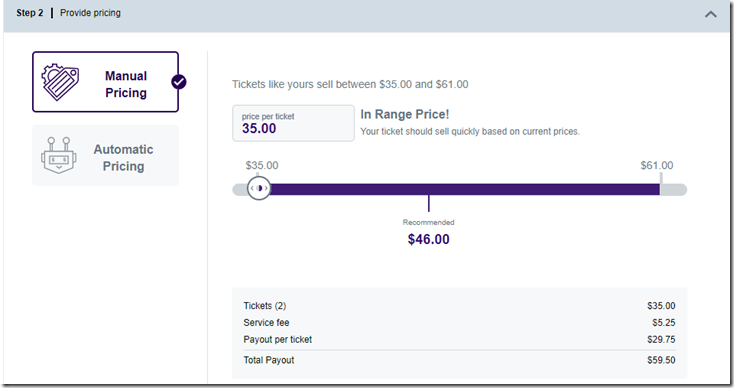
These are my usual seats—Section 18, Row 71. You can manually set your price as low as $6.00 but you have to know to click the purple box with the price per ticket—the slider stops you at $35, which is where the bulk of tickets are currently priced. If you were to buy my two season tickets for the Rutgers game for their recommended price, I would get $78.20, you would pay $126.98, and StubHub pockets $48.78—over 38% of the transaction.
(Actually it’s a little bit more because they sneak an extra $0.55 onto the price of tickets—the explanation for that is more convoluted and doesn’t always apply.)
This is a problem for Michigan because in order to fill its stadium, they need their fans to cover whatever StubHub’s Fanucci-like fingers reach for. And since it’s in StubHub’s interest to keep the market artificially inflated, most Michigan fans who would go to a reasonably priced game can’t find a reasonably priced ticket even when a third of the stadium is listed on the exchange.
What are Tickets Really Worth?
[Barron]
My tickets say I paid $70 each for these so you’re getting them for less. In reality it’s very hard to figure out what I paid for them because Michigan sets the values based on the secondary ticket market, then hides those values by shifting the price of some tickets to others and tacking on fees.
There is a $160 fee to “join the interest list” which is really just your Preferred Seat Donation for 2 tickets at the lowest level, which they then pretend to “waive” for your first year. Slick. PSDs for the bowl go up to $660 per ticket, but what they’re really doing here is taking the cost of buying every ticket from the secondary market, subtracting a piece that they rebrand as a “PSD” to bring down the printed face values of the tickets, and then shifting some of the cost of the premier games. The get-me-in seats a month away from an Ohio State game go for about $250 each on the open market. My Ohio State ticket says $145 was its sticker price. The difference is in my PSD but also in my “$70” Rutgers ticket.
Using the same typical secondary market price, really the school is charging me $35 to include the Rutgers ticket in my package. The other half of the listed price is a mirage to hide the fact they’re pricing these packages for exactly what people would pay for them if they conservatively wanted to buy them on the secondary ticket exchange. That includes the same 80-percent retail surcharge as StubHub.
The Ohio State Ticket Package
You can see the math more clearly when you go to purchase the ticket packs. Here is the most popular sale going on right now:
Let’s say Sue and Ben both want to take their spouses to every Michigan home game this year. Sue buys season tickets; Ben just goes on StubHub and buys literally the two cheapest tickets he can find on there today. What do they actually end up paying per seat?
| Via | PSL | WMU | Wash | NIU | Rutgers | NWern | Indiana | Ohio St | TOT |
|---|---|---|---|---|---|---|---|---|---|
| Michigan | $80 | $60 | $145 | $55 | $70 | $70 | $70 | $145 | $695 |
| StubHub | $- | $62 | $170 | $42 | $62 | $56 | $61 | $228 | $679 |
| Diff | -$80 | +$2 | +$25 | -$13 | -$9 | -$14 | -$9 | +$83 | -$16 |
Michigan is charging its season ticket holder marginally more than it would cost her to buy the same plan on the secondary market at peak pre-season pricing. For locked in slightly better seats, sure. My point is Michigan isn’t selling you an Ohio State ticket for less; they’re selling you a retail product at peak retail pricing and pretending it’s wholesale.
Again, whether you think a capitalist entity acting like one is morally wrong is not part of the discussion (and I’d ask you to keep it out of the comments please). The thing is fans have started to get wise. Also they’re not all fans of the same teams.
The OSU-RU-NIU package is the cheapest way to purchase two Ohio State tickets. Considering the secondary market for Ohio State-Michigan games often reaches $250 to get in, that $280 isn’t so bad of a deal if you are looking to just go to The Game. If you can pick up something for the other two games, all the better. And therein lies the problem, especially because it’s not just Michigan fans buying them.
Ohio State fans are looking at this deal and thinking the same thing I just wrote. I would guess they’re a substantial part of this market, which is only controlled by sending a shareable code by email. That code is indeed being shared on Ohio State sites.
But it’s not just Ohio State fans buying this “Package” with no intention of seeing Rutgers or NIU. And we can tell because there are thousands of seats—in literally every non-student section—available on the secondary market right now. I went around just the endzones this morning and found 2,128 seats listed on StubHub for Rutgers, or about 8 percent of seats in those zones. In July. It should be like 2 percent.
I don’t think it’s hard to draw a line between the ticket packs priced $30 over the secondary market value of an Ohio State ticket, and the flood of tickets people are trying to sell immediately after they buy them.
But if there are so many tickets for sale, why isn’t the ticket price going down?
Empty Seats are StubHub Seats
The answer is StubHub wants to keep the price artificially high, even if the bulk of those tickets never move. Counterintuitively, selling every ticket, and taking the maximum amount of money from customers, are not at all the same thing. The bean counters don’t care if one person pays $60 for a Rutgers ticket or if three people pay $20, except the latter has more upside. From StubHub’s perspective, the more expensive the ticket, the more money they get. MLB has been operating on this principle for years. The seats I had in 2005 used to be $12 and I could usually sell them for $10 to someone who wanted to go on a Tuesday night. Tonight they’re $35. And look how many are available:
You would think all of that supply with historically low demand would lead to some cheap seats. But remember what I told you about the prices being inflated. The sellers aren’t savvy ticket resellers; they’re football fans anxious to make back what’s “Face,” which for Rutgers tickets says “$70.” It’s already rough on them to list those seats for $35, even if 2,000 other tickets are listed at the same price right now. If you actually price them to sell (at like $15), ticket brokers will snatch them up, match them with other seats, and resell them.*
StubHub then uses various tricks, mostly psychological, to convince sellers to list their tickets way above the market. Here’s what the Rutgers seats look like right now on the only exchange for mobile tickets for two together:
That’s the two-together get-in price. If you’re thinking of bringing your kid to a lighter game that you don’t mind leaving early to introduce them to Michigan football, you’ll look at that price and probably think it’s best to wait another year so they can appreciate it. If you and three old college friends are looking to have a reunion and bring the wives, they’re going to look at the price tag and say “That’s more than we’re paying for the AirBnB.”
They’re absolutely not worth that. I spent a decade of Michigan fandom scrounging up tickets and if I ever paid $30 for a Rutgers ticket it was on the 50 yard line. Lately readers have sent them to me to find them a home. I always do. And that tells us something.
Let’s go back to the seller’s side. Here’s me putting the same tickets you see above into their system:
Look what they’re telling me:
- Tickets like yours sell between $35 and $61.
- $46 is “Recommended”. Look at the bar—it’s even conservative!
- Your ticket should sell quickly based on current prices.
- The $35 you put the slider at is the low-low.
- You’re so savvy you’re using Manual pricing. Are you sure you don’t want us to handle it for you? Look at that smart robot!
- You can’t even move the slider below that. Why would you want to?'
If you actually want to go below that you have to figure out that the “35.00” in the gray box is editable. The fact that you can do this is a canard—most people won’t, and that results in a market set where StubHub wants it set. Even if the whole stadium goes on sale, they want the get-in price to be high enough that it costs the buyer $100 for two seats to a 2021 Michigan-Rutgers game. If thousands of people who would go if the price was more reasonable will balk at the price and watch at home, a third as many will bite the bullet and pay the exorbitant prices, and they make the same money.
It might be considerably worse than that because of the current financial situation of StubHub. Right before the pandemic (oooh) the founder repurchased it at $6 billion from the British parent company that owned it. That transaction, which Forbes called the “Worst Deal Ever” has gotten even worse than “I bought the world’s largest live event ticket reseller weeks before a global pandemic” since, because the UK is holding up the deal under anti-trust laws, meaning the new owner can’t get in to fix anything that’s broken, and the people currently operating that business couldn’t care less.
Would they care about Michigan-Rutgers? Probably not. But if they saw the college football market had an extraordinary amount of supply for extraordinary little demand, they might step in and configure some things to get things moving again. As it is, these tickets aren’t moving. It’s July, so the people buying are just deal searchers and travelers (e.g. our group of 8). But tickets are also a commodity with a hard expiration deadline, and there’s no way to move the numbers they’re already holding at the prices they can come down to, especially since a significant portion of the market likely only bought them as a write-off.
*You don’t have a chance against the brokers, especially when it comes to larger groups. They’re way ahead of you, playing the margins in many ticket markets. That too contributed to my malaise about writing these posts. The original purpose was to help Michigan fans find and sell their seats, but there’s nothing more I can recommend that an industry with more time and tools than either of us hasn’t turned to their own profit.
Can We Skip StubHub?
There is a method. Michigan allows fans to transfer their tickets for free through their online system. I am not positive this will work for digital tickets purchased as part of the packs. But if you do match up with other Michigan fans you and your partner can avoid having to pay an extra $15 for every $20 you’re spending on the tickets, so long as you can find your way through the convoluted ticket transfer system. Fewer paper tickets will mean a lot fewer of these transactions, which means a vastly smaller market. I would try to go that route if at all possible.
Michigan Fans Would Fill the Big House if You Remove the Parasite
Worth it. [Fuller]
So let’s recap:
- Michigan fan interest is at a deep low.
- Turnout will be suppressed by the pandemic (please get your shots!).
- Ticket prices, set based on 2019’s secondary market, are well above market value.
- There’s already a huge glut of seats on the secondary market from selling
- Options to resell tickets outside of the secondary market are low.
The school priced their season tickets to make sure they’re making the maximum these tickets would sell for on a free secondary market. Since they’re going to be letting players make money off themselves finally I don’t have any more moral qualms about Michigan athletics getting paid what the market will bear to fill their stadium.
I do have a problem, as a Michigan fan, with Michigan following professional sports into the Malthusian margins where they are filling the stadium at 75% capacity for normal games because the bottom line is higher if you can gouge the fans who can afford it than if you price the building to fill.
And those concerns are turned up to eleven now that the system is expecting the market to bear 2019-level margins. Remember in 2019 Michigan was a favorite to win the Big Ten. Things have changed, and the prices for the tickets haven’t. So what we’re headed for this season isn’t just a breaking point of fan disinterest in a relatively bad team, in a sport where only the same three in 130 teams have a realistic chance of winning a championship. We’re looking at a market that was already bubbled way out of proportion to what the fans would bear, and probably in the process of popping, before an international pandemic and economic belt-tightening.
Can Michigan Do Anything About It?
This is tricky because I don’t know their parameters, and am wary about demanding the school do things outside of their power. That’s a neat way to get attention while assuring your mark can’t ever fix things, so you get to keep being angry forever and ever. Not that I ever see people do that sort of thing.
Realistically then, here are a few ideas on Michigan’s end to start alleviating the bubble:
- Take Ohio State off the ticket pack options immediately, then make those tickets available, at that $140 face value, to Michigan fans who have purchased tickets to non-Ohio State Michigan athletic events.
- Also make these tickets available through Alumni Association clubs, and mailing lists where they are certain to have 90%+ Michigan fans (like the Kids Club members, UGP and M-Den’s mailing lists for customers who’ve bought licensed gear, and students).
- Work with their app developers to track who is coming to Michigan athletic events, and implement a point system that gives priority to fans for showing up to support Michigan sports. Currently the points system is almost entirely purchasable. It should not be restricted to donors—the kinds of fans who are going to every women’s basketball game, buy softball season tickets, and haven’t missed a football kickoff since 1984 are not “We’ve already got them” people to soak—they’re your core ambassadors, as important to you as the too-smart-for-their-own-good Michigan alumni are to us.
- Work with StubHub to free the secondary market. Cap fees if possible. Ask them to turn over their glut of downticket game seats (and compensate the sellers their meagre shares)
- Start dumping free tickets now. Give those seats out to youth leagues, high school football teams (Belleville?!), 7-on-7 teams, athletics alumni, and other adjacent entities you want to keep happy.
- Promote inexpensive ticket options to low-rent games at all live events with Michigan football fans. If there’s an alumni club volunteer project at Forgotten Harvest, the leader should have a code to give out to participants for $20 seats to Rutgers or NIU etc.
- Promote extra seats to adjacent season ticket holders. If two seats are available next to someone who’s bought season tickets for 5+ years, send them an email letting them know their loyalty allows them first dibs on those seats at a much reduced value.
I realize they are already promoting through email channels and giving tickets away to some of the local groups they’ve worked with in the past (like some local churches). They are clearly aware that an empty stadium is a bad look, and there’s only so much they can do about it. I don’t know how seriously the athletic department themselves are taking it.
As for fans looking to buy tickets right now, wait on everything but Washington (for multiple tickets—singles will come way down) and Ohio State, unless you are seriously interested in going to two other games on two other tiers. Every ticket you buy is one less red stain on The Game.
I took part in a high-level conversation today about how Michigan can leverage its world class donor base to buy better players. Apparently some people with deep pockets care.
The "money cannon" is a bit. We are small potatoes on the grand scheme, but we have a huge community who reads this blog and who follow the Shutdown Fullcast people who run their annual charity, and whence the money cannon joke is derived. That's a crazy large internet community but the money for competing with Georgia for a player who wants to come here but is getting offered $80k by Georgia boosters is going to come from a donor base that's already been sick of buying new benches for taping and whatever.
Lots of Alumni season ticket holders live out of state and can't go to every game, so I don't like the idea of being penalized because I can't make it to a bunch of games.
I was very pleasantly surprised at how much a pair of my season tickets sold above face value (even with the PSD) this year. Really didn't know what to expect but that was fantastic.
The most disappointing part of Stubhub now (besides the ever-growing fees) is that they took away any visibility to how much tickets have sold for. It doesn't matter how much tickets are listed for, what matters is how much they sell for and that is very critical information to have when you are selling tickets, especially when you have aisle seats or any other added feature - like seat cushions. That is never factored into the 'recommended' price range.
This was really interesting and also bummed me out. As an out of stater it’s already expensive enough to find a reasonable place to stay in town unless you plan 6-9 months out. Getting cheapish tickets to see us play normally-bad teams has made the experience a bit more palatable even when we are bad. But it’s basically a grand per person these days to fly in for 2-3 nights and a game, which is increasingly hard to justify with the added indignity of “paying $80 a ticket to see Rutgers.”
I thought the nickel and dime shit would end when Brandon was shitcanned, but it's only gotten worse.
So maybe this isn't the best year to start my MGoB&B? Only for MGoBloggers that I can vet thru their posting history. I don't think i would be vying for the same customers as the fine sponsor The Residence Inn. Only for home football weekends (maybe a nice Bball matchup or two). Blueberry and chocolate chip pancakes or waffles or maybe some omelettes and decent toast, passable coffee for breakfast.
Wow! Great article! I knew stubhub was a crock, but didn't realize how blatent.
Heard Gene Smith talk a few years ago and he said declining football crowds were a national happening. All the ADs are concerned, starting with getting students into the game. If they don't go as students, many do not go as alums. And alums that don't go to football games tend to donate less to other parts of the university, not just athletics. So, it still is the almighty dollar....but I'd rather my $ went to the university, not the stubhub bastards.
Any chance a fine southern gentleman such as myself can get one of those rooms? I promise not to leave mudbug shells on the carpet and I'll even take off my swamp waders before entering the room. Before booking, though, I need to know whether your passable coffee is made with or without chicory.
Game against OSU will be 80% OSU fans. It will be an embarrassing sight.
Maybe it will finally motivate the AD to get off their asses and fix the pricing of tickets so regular Michigan fans can start attending games and bringing their families.
Fingers crossed, maybe. But it's not like the 60-70% OSU attendance the past few years seems to have caused the AD to lose much sleep...
Opposed to the embarrassing sight of losing by 30?
Exaggerate much?
More like 25 % until Michigan fans leave at or after halftime and 80% by the end of the game.
I'm one of the remaining 20% who will be there in The Big House, win or lose, until the final seconds tick off the clock. I can count on one or two fingers the # of times I have left early in the 43 years (1977-2019) I've had season tickets, and I'm not about to change now or in the future, at least as long as I continue getting season tickets.
The bigger dilemma for me, though, is how long do I really want to continue getting season tickets? Although I'm not yet to the breaking point, it has become a consideration over the last 3 or 4 years, and the 2020 pandemic season clearly has pushed me closer to that breaking point. I'll be there, God willing, for 6 of the 7 games and a road game or two this season.
Beyond that, though, is going to be a year-to-year decision.
Exaggerate much?
More like 25 % until Michigan fans leave at or after halftime and 80% by the end of the game.
I'm one of the remaining 20% who will be there in The Big House, win or lose, until the final seconds tick off the clock. I can count on one or two fingers the # of times I have left early in the 43 years (1977-2019) I've had season tickets, and I'm not about to change now or in the future, at least as long as I continue getting season tickets.
The bigger dilemma for me, though, is how long do I really want to continue getting season tickets? Although I'm not yet to the breaking point, it has become a consideration over the last 3 or 4 years, and the 2020 pandemic season clearly has pushed me closer to that breaking point. I'll be there, God willing, for 6 of the 7 games and a road game or two this season.
Beyond that, though, is going to be a year-to-year decision.
I wouldn't pay money to watch a Jim Harbaugh-coached football team. Period.
My cousin asked if I'd like to make the drive to Happy Valley with him this season. I said something like "Hell no, I won't contribute to Harbaugh's salary anymore".
I'd really would like to see every Big Ten stadium at some point, but not at the expense of basically knowing the outcome before it happens. It's hard to win on the road, everyone knows this, but it was never this bad under Carr.
I've also never seen another team other than Harbaugh coached Michigan have to take a timeout before even running a single play, like the last time we went to Happy Valley.
Cancelling your cable, internet and/or streaming apps too?
Before the pandemic lockdown my family and I were planning on attending the Washington game in Seattle. We live in Oregon and planned on taking the train from Portland and making a weekend of the experience. I am the only alum in my family but my two daughters their husbands were going to join my wife and I. I foolishly called the alumni office to see about buying tickets and was told they didn't handle ticket sales any longer and that I needed to go through stub-hub. The quoted price was so high that we canceled the trip even before lockdown and the games cancellation. I got me thinking. I'm retired, no longer have family ties to Michigan and my grandkids attend Oregon, and Oregon State. Other than checking the obits of classmates I don't spend much time reading the alumni publications. I will drop my alumni membership when it expires next year. It is sad but other than the basketball team I've lost my lifetime devotion to all things Michigan.
How are tickets on sale on StubHub already? Are these just individual tickets/ones from the ticket packs? I didn't think season tickets have started going out yet; I certainly don't have mine...
You can list without the barcodes and add the barcodes when the tix arrive or when they sell. I never add the barcodes until they sell. So if you know your seat numbers, you're good to list.
That just seems so weird, that the tickets can sell before the barcodes are added. I guess StubHub can refund the buyer's money if the barcode doesn't materialize or isn't legit, and maybe they just hold onto the money until the barcodes are added, i.e. the seller doesn't get paid until then.
As the seller, you don't get paid until the barcodes go in. You get a notification and if you don't download within 24 hours the transaction is voided. I would keep the barcodes off because I was trying to sell them on the ticket spreadsheet here, too. If I weirdly have 2 buyers for the same game at the same time (one on StubHub and one here) I will sell to the one here - I get more money that way and the buyer pays less, too.
Makes sense, thanks.
For a school with a top 20 economics department, the ignorance of supply & demand is shocking
For someone with "econ" in their username, the level of disdain and condescension in your post is un-shocking.
What's your point? That we should all understand how prices can be set under a monopoly & so we shouldn't need an article to explain why there could be 10000 empty seats? Or is it that too many posters assume that they should be able to access affordable tickets when there's clearly more demand than supply?
I do think something is very different than it was 5 or 10 years ago, and it's worth understanding how it works. No more showing up at the gates after a tailgate and getting a couple of $10 tickets together.
Relax, I think he was talking about the AD not the article.
Fine, but that's still not the point. UMAD and stubhub understand markets perfectly well - that's why we're in this situation, because they have monopoly power.
I think the actual gripe is that UMAD doesn't understand its target audience and how this ruthless application of economics is going to affect the future
Just chiming in to say I appreciate you so much, Seth. You’re a true hero.
Brian, please feel better. Hope to see you soon.
I'm probably a minority, but I have not purchased tickets to attend a game for several years and no longer really support the program because:
- The product on the field is very unsatisfactory to me personally - predictable, underachieving, and generally boring.
- Ticket prices and related costs are out of line, IMO.
- I view the facilities for UofM athletes as being over the top - they're like an upscale country club, IMO.
- Most of the football players are not really students.
- I see much of the UofM faculty, administration, and graduates as being pretty far left and generally supportive of policies and practices I oppose.
Overall, I no longer have the interest and passions in/for UofM that I once possessed. I'm pretty sure I won't be missed but I believe I'm not alone in my thinking.
So fixing this problem (still not sure what it is after reading that) is for them to make less money on tickets?
If they want long term ticket demand, yes.
Seth-
This was a great, if depressing read. Well done. Personally, I had 2 pair of season tickets before this year, gave up one pair, and honestly am kicking myself for keeping the second pair.
It's not as much fun as it used to be to go, and that's a result of the on-field product, the in stadium experience, and my own unwillingness to spend that much time watching touchdown-commercial-extra point-commercial-kickoff-commercial from inside the stadium.
I feel like Canham's understanding of sports fandom wasn't that innovative or exceptional, and yet every year no one seems to understand his insights.
I think of it this way. My dad started getting season tickets in the early 70's. He loved taking his family of four to a game and attended nearly every Michigan home game until his passing.
Those seats were put in my name at the first opportunity (2004 or 5 I think) so we still have the same seats. Given the costs today of not just the tickets, but the fuel, food and sometimes lodging involved in a game weekend, I really have to wonder if he were 28 years old today would he even bother getting season tickets.
The day grows nearer where I simply won't be able to justify the cost.
Your multi-step "bubble fix" is excellent, but has a huge fundamental roadblock.
Time and again, the Michigan Athletic Department has shown it just doesn't care about the desires of prospective attendees, or students, or really, anything - just "how do we make more money".
It's not unique to Brandon's AD tenure, and it's not unique to Michigan.
But we certainly have failed to apply the notion of "leaders and best" as far as how we treat prospective ticketholders.
I respectfully disagree with all of this blather, blaming StubHub and digital tickets. There will be vast patches of empty seats this year because of neither. The product is so devalued that it is what it is. Can't wait till the attendance for a 2/3 full NIU game is announced at 101,541.
It is also important to note that the intermediary here, in this case Stubhub, has no real buy-in or incentive to sell your tickets other than good ol fashion commerce. If you list your tickets at $35 and dont sell them because there are 2,000 other tickets for sale at the same price, it doesn't really cost stub hub anything other than the routine cost of web maintenance. Obviously they prefer to sell as many as possible so they can get paid too, but they arent out a real monetary investment if you dont.
Great post. I know this is beyond the scope of the article, but a potential solution for this in the future is NFT/blockchain ticketing. It completely eliminates the need for a centralized, predatory marketplace, but still allows the property/artist (Michigan, in this case) to take a cut of all resales. Mark Cuban is already beating this drum (since he owns a sports property and a ticketing entity).
NFT tickets come with other very cool advantages as well. More here for anyone interested.
An often overlooked group of people the U could promote cheap tickets to: staff. M is the largest employer in Washtenaw county. The number of staff I speak with who would love to go to a game, but have never been is astounding. Give the people who work hard every day to keep the U running an affordable (or free) chance to take in one of the University's signature experiences.
There are a lot of existing programs they could do this through. They could pick departments at random. Heck, they could start by rewarding the front line staff who've continued to work onsite through the pandemic! A lot of staff are feeling really underappreciated right now. This could help start to alleviate that.
Just win the football games. This is an on field performance problem, not a predatory / corrupt athletic department problem.
Really interesting read. Will provide a lot of context if we see a relatively empty stadium this year.
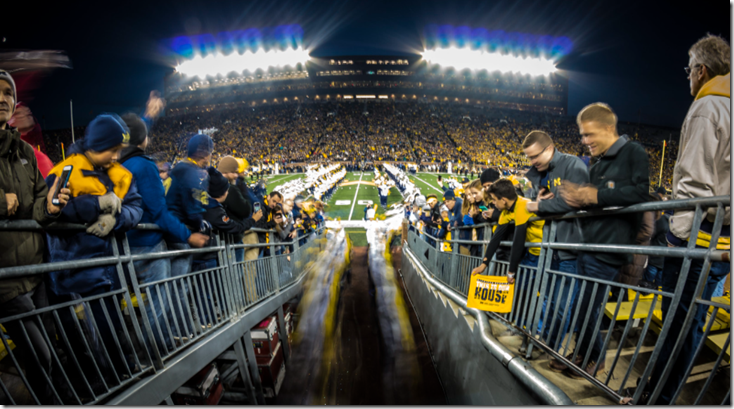
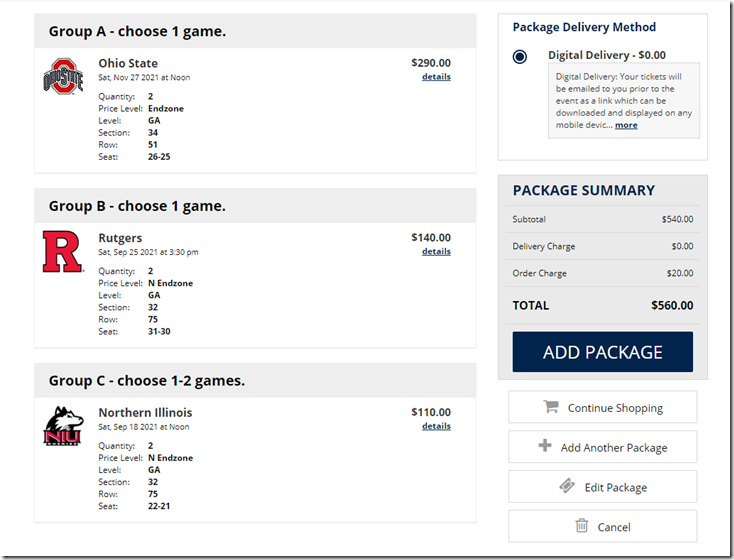
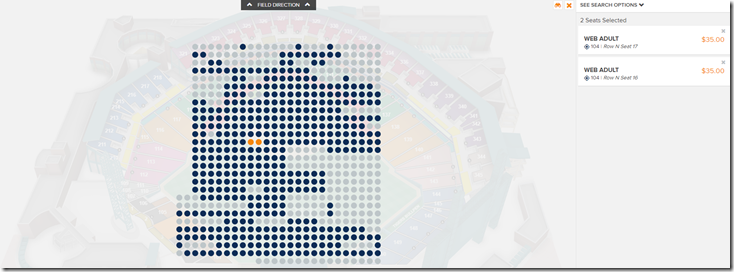
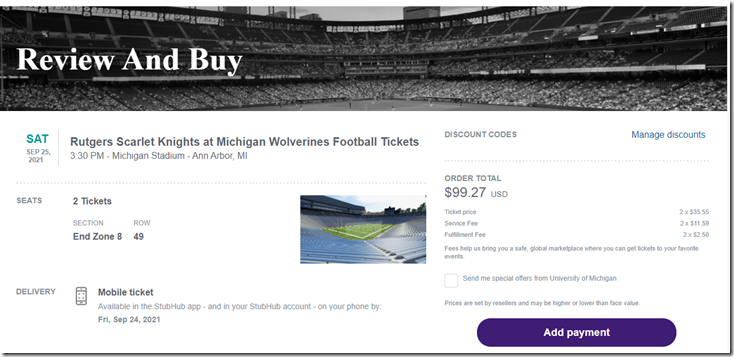

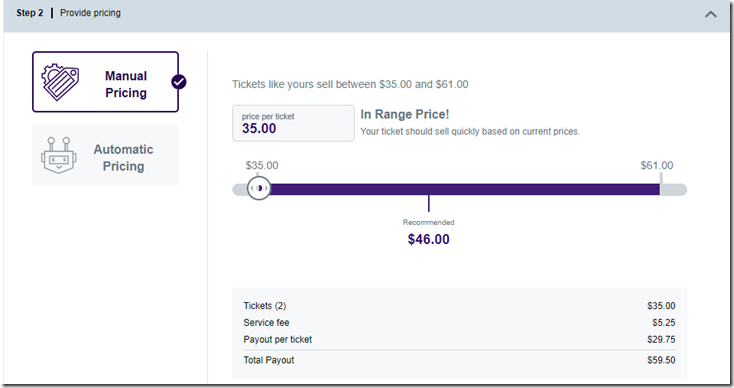
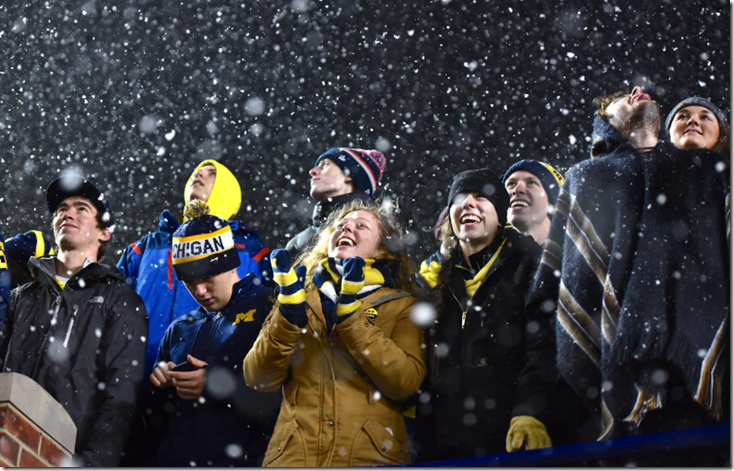
Comments